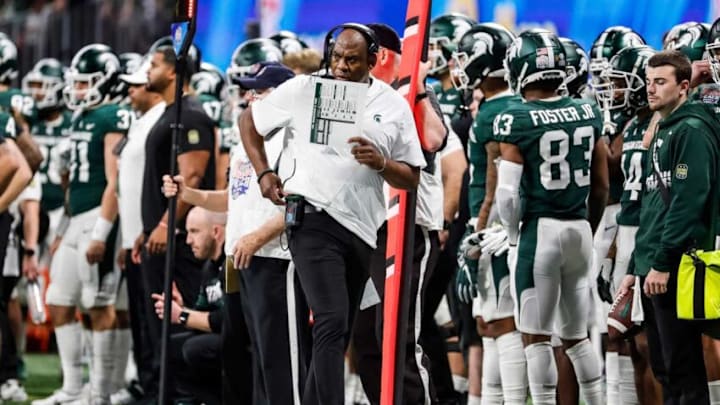Ron Burton made a lasting impact on the Michigan State football program. His announcement that he is leaving the program is the modernizing MSU needed.
Ron Burton is a staple in the Michigan State football coaching lineage. Beginning his career with the Spartans in 2013, he found his true home after spending the previous 10 years with Grand Valley State and Air Force coaching the defensive lines at both programs.
When joining Michigan State, he made an instant impact under then-head coach Mark Dantonio. Burton led the Spartans to the Big Ten’s best rush defense and proceeded to maintain that three additional years (2014,2017, and 2018). He also contributed heavily to Michigan State’s success overall as a defense, ranking inside the top 25 nationally six times in his eight years with the program.
Despite all of his success, on Sunday the final piece of the puzzle, for now, coach Mel Tucker and his pursuit of modernizing the culture of Michigan State’s football program needed was complete when Burton announced his departure on Twitter.
— Ron Burton (@CoachRonBurton) January 16, 2022
Tucker, since arriving in East Lansing, has preached accountability, relentlessness, and competition — all components that Burton’s defensive lines have embodied during his tenure. However, that competitive nature isn’t just important for the players, but also the coaches, and Tucker was determined to increase that competition when he hired Brandon Jordan just a few days prior to Burton’s announcement.
Jordan has made a living increasing the capabilities of some of the NFL’s best pass rushers such as Von Miller and T.J. Watt, just to name a couple. Jordan’s hiring signaled another culture shift in the Michigan State football program. It signaled another step in modernizing the way that the program looks at its coaching and the direction of college football and what it takes to win at the highest levels of college football.
Burton is a great coach and has done impressive things with the players he has had under his direction; however, Burton was an “old school” coach and recruiter.
Taking a look back at some of the more influential players this last season on the defensive line, individuals like Jacub Panasiuk, Drew Beesley, and the fast-rising Simeon Barrow Jr. — none had Burton as their primary recruiter. It was Mike Tressel who played the primary recruiting role for Barrow and Panasiuk, while Burton played the secondary role for Beesley who was a walk-on, according to 247Sports. He didn’t blaze a significant trail to attract the best of the best to MSU.
Jordan, on the other hand, is a head-turner and one that garners a lot of attention because of his track record with players at the highest level: the NFL. He has coaching experience at the college level, which will help him, generally, while being back roaming the sidelines. However, walking into a recruit’s home and name-dropping the likes of Chandler Jones, Watt, and Miller — all of which sought out his private help through his company, Brandon Jordan’s Trench Performance — will bring a different level of attention to Michigan State as a premier place for defensive linemen to thrive. Champions are won and lost in the trenches, and this is a sequence of events that signals Tucker’s recognition of that.
The excitement that a hire of Jordan’s stature brings is one that sends shockwaves across the college football landscape. It’s unconventional, but college football itself has become unconventional; a vast departure from what it once was. Twitter, online presence, NIL deals, flash, and pizazz that catches youth’s attention is what college football and recruiting have turned into. That’s not a strength for Burton. At most, his online presence was relegated to retweets of posts from others. That’s not going to get the job done in today’s day and age.
Michigan State wants to be atop not only the Big Ten but the national rankings. Tucker has made it clear: MSU will compete for a national title.
Burton had a ceiling and a ceiling that just wasn’t high enough for where Tucker and Michigan State, including the donors that ponied up to keep Tucker just a few short months ago, want to be. It’s a culture shift, and the latest step in injecting youth and excitement into the coaching staff. It’s a modernization of the program yet again, one of which is how the best of the best get to (and stay) the top of the college football landscape.
Burton will always be a valuable member and memory for Michigan State, and the fan base — myself included — offer our sincerest gratitude for the work that he did in his nine seasons. However, for MSU to reach the pinnacle that is now expected, Burton’s departure and Jordan’s hiring is a representation of Tucker’s relentless desire to modernize the Michigan State we have known to this point. It had to happen.
Burton was the last of the holdovers from the MSU program who had hit its apex a few years ago and started its tumble back down toward mediocrity at best; too unwilling to change its ways and adapt in order to remain, even just, relevant. Instead, Burton’s continued time on the staff represented contentment, remaining comfortable, and riding the history train towards the cellars of the Big Ten.
This change signals a commitment to, yet again, impact the culture by staying with, and in front of, the times necessary to rise to the top and compete against college football’s elite.
